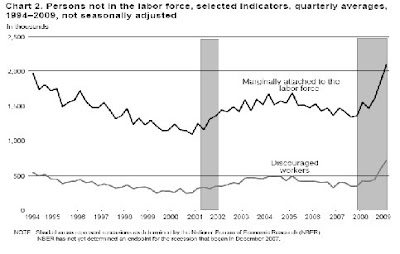With the current recession creeping toward it's second full year (even if NBER calls June the end of the downturn, as some predict, that will make the recession 18 months), this is the longest contraction since the Great Depression. Calling a recessions is academic for this instance. Today, I want to know what happens in long recessions. The figure below charts the unemployment rate (the BLS' headline U-3) and the ICS (the University of Michigan and Reuters confidence index that I used before.
 The model that I provide is hyperbolic, allowing it to take the curved shape in the blue regression line. The model, which accurately predicts the current ICS from the September unemployment rate, indicates that small changes in the unemployment rate drag on confidence more than at high levels.
The model that I provide is hyperbolic, allowing it to take the curved shape in the blue regression line. The model, which accurately predicts the current ICS from the September unemployment rate, indicates that small changes in the unemployment rate drag on confidence more than at high levels.The model is far from perfect because unemployment is one of the last indicators to recover form a recession. Yet unemployment tends to peak at the end, or just after the end of a recession. So we can use high unemployment levels as as a proxy for the length of a recession.
People appear to be most respond emotionally to the beginning of a contraction. We're seeing this now. Chairman Bernanke called the recession "officially over" recently and the Fed said in it's FOMC statement yesterday that consumer spending is "expanding."
Oh for the wonks, the model specificaiton is:
ICS=187 (1/unemployment rate)+54
R2=.25
*The model outperforms ln, linear, or quadradic specifications
Data from 1978 to present




